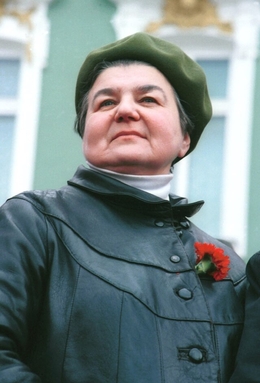Nina Andreyeva facts for kids
Quick facts for kids
Nina Alexandrovna Andreyeva
Нина Александровна Андреева |
|
|---|---|

Nina Andreyeva, 1 May 1995
|
|
| General Secretary of the All-Union Communist Party of Bolsheviks | |
| In office 8 November 1991 – 24 July 2020 |
|
| Personal details | |
| Born | 12 October 1938 Leningrad, Russian SFSR, Soviet Union |
| Died | 24 July 2020 (aged 81) St. Petersburg, Russia |
| Political party | All-Union Communist Party of Bolsheviks (1991–2020) |
| Other political affiliations |
Communist Party of the Soviet Union (1966–1991) |
Nina Alexandrovna Andreyeva (Russian: Нина Александровна Андреева, 12 October 1938 – 24 July 2020) was an important figure in Soviet and Russian history. She was a chemist, teacher, and writer. She was also a political activist who strongly supported traditional Soviet ideas.
Andreyeva became well-known for an essay she wrote called I Cannot Forsake My Principles. In this essay, she defended many parts of the old Soviet system. She also criticized Mikhail Gorbachev, who was the leader at the time. She felt he was not a true communist. The official party newspaper Pravda called her essay The Manifesto of Anti-Perestroika Forces. This showed how much disagreement there was about the changes happening in the Soviet Union.
Contents
Early Life and Chemistry Career
Nina Andreyeva was born in Leningrad (which is now called St. Petersburg). She studied chemistry and later became a chemistry lecturer. She taught at the Leningrad Technological Institute.
Around 1966, she joined the Communist Party of the Soviet Union (CPSU). This was the main political party in the Soviet Union.
The Famous Essay: I Cannot Forsake My Principles
Andreyeva's essay, I Cannot Forsake My Principles, was published on March 13, 1988. It appeared in the newspaper Sovetskaya Rossiya. At this time, Soviet leader Mikhail Gorbachev was away from the country.
What the Essay Said
The essay was very critical of Perestroika. Perestroika was a set of reforms (changes) that Gorbachev was trying to make. These reforms aimed to improve the Soviet economy and society.
Andreyeva strongly defended Joseph Stalin, a former Soviet leader. She believed that criticisms of Stalin's time were being exaggerated. She felt that the changes under Perestroika were going too far.
How the Essay Was Received
Many party officials who did not like Gorbachev's reforms welcomed Andreyeva's essay. A high-ranking party secretary, Yegor Ligachev, even told the official news agency to share the essay widely. It was printed many times across the Soviet Union and East Germany.
At first, there was no official criticism of the essay in the media. Some local television even showed support for it.
Official Response to the Essay
When Gorbachev returned, the party's top leaders discussed Andreyeva's letter. On April 5, 1988, an official response appeared in Pravda.
The Pravda article said the letter showed "nostalgia" and "backward-looking patriotism." It called Andreyeva's views "blind, die-hard, undoubting dogmatists." Gorbachev later said that many leaders agreed with Andreyeva. He had to convince them to publish the official response. He saw her essay as a direct attack on his reforms.
Andreyeva's Views on Change
In 1989, Andreyeva spoke to a reporter from The Washington Post. She said that under Stalin, the country had built socialism for 30 years. She believed that the media was lying about Stalin and "blackening our history."
She also worried about the new political groups forming. She felt they were "anti-socialist." She criticized some media for showing artists she felt were not truly Russian. She also expressed strong views against "cosmopolitan" ideas, which she saw as a threat.
After the Soviet Union: A New Party
By July 1990, Nina Andreyeva was leading a group called Yedinstvo (Unity). This group wanted to bring the country back to the original ideas of Vladimir Lenin. She planned to leave the Communist Party of the Soviet Union.
After the Soviet Union broke apart, Andreyeva helped create new communist groups. In November 1991, she helped form the All-Union Communist Party of Bolsheviks. This party saw itself as the true successor to the old Communist Party. Andreyeva became its general secretary. The party wanted to replace the new Russian president, Boris Yeltsin.
In October 1993, her party was temporarily stopped from operating. This happened after a political crisis in Russia. In May 1995, she was removed from her leadership role in the party's St. Petersburg branch. This was because of a "lack of revolutionary activity."
Nina Andreyeva passed away in St. Petersburg on July 24, 2020, at the age of 81.
Works
- Andreyeva, Nina (1992). The Cause of Socialism is Invincible. Pyongyang: Foreign Languages Publishing House. ASIN B0041SY99A.
- — (1993). Unpresented Principles or a Brief History of Perestroika: (Selected Articles and Speeches). Pyongyang: Foreign Languages Publishing House. OCLC 476436091.
- — (2002). Leningrad: Publishing House of the All-Union Communist Party Bolsheviks.
Images for kids
-
Nina Andreyeva, 1 May 1995
See also
 In Spanish: Nina Andreyeva para niños
In Spanish: Nina Andreyeva para niños
 | Bessie Coleman |
 | Spann Watson |
 | Jill E. Brown |
 | Sherman W. White |


